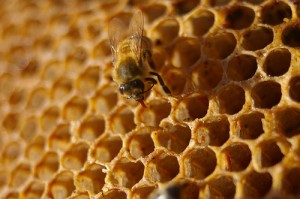Manuka Honey Fights off Clostridia Infections
Honey has been used for thousands of years to fight various external infections, and more recently raw honey has been found to ward off various superbug infections.
Now we find that one of the most powerful forms of raw honey, Manuka honey, inhibits one of the most difficult-to-treat gut infections, clostridia.
In this article
What is Clostridia?
Clostridia – which causes many cases of colitis – is an overgrowth of the bacteria called Clostridium difficile that often follows a course of antibiotics. The Clostridium difficile bacteria often grow back the quickest because they are rarely eliminated by antibiotics as they are resistant to many antibiotics. In addition, Clostridium difficile are vigorous bacteria so they also tend to grow back the fastest.
Because of this issue, antibiotics are not always very successful against Clostridium difficile. Nature’s antibiotics provide a clearly healthier and more sustainable alternative.
Three strains of C. difficile tested
The researchers, from Australia’s University of Wales Institute Cardiff, studied three different strains of Clostridium difficile. Because different strains become more or less tolerant to antibiotics, the three strains of C. difficile represented different types of colitis-type infections.
The researchers gave different strain biofilms exposure to a multiple of different concentrations of Makuka honey, each for 24 hours.
The researchers found that not only was the Manuka honey able to inhibit the colonization of the C. difficile strains. The researchers found a dose-dependent reduction of colonies.
This is the gold-standard for confirming that a particular product inhibits a microorganism. If it is increasingly inhibited as the compound’s concentration is increased, then other possible causes for the inhibition become marginalized.
The inhibition of the bacteria colonies of C. difficile occurred the greatest when the concentration of Manuka within the test environment was between 40 and 50 percent weight to volume.
Biofilm formation blocked
The mechanism appeared to be related to the fact that Manuka honey blocked much of the ability of the bacteria to form biofilms. Biofilms are polysaccharide excretions by bacteria that allow them to adhere to surfaces – whether they be external or internal.
This ability of Manuka honey to inhibit the biofilm production of bacteria has been seen among other studies, for example, German researchers found that Manuka honey inhibited Streptococcus pyogenes – which can cause strep throat and other difficult infections. Researchers from Denmark’s Technical University of Denmark found that Manuka honey inhibited growth of Pseudomonas aeruginosa bacteria, which can cause many types of infections.
Some of this research with honey has found it can inhibit the growth of bacteria colonies within a water medium, as well as inhibit biofilms. Inhibiting biofilm formation, however, is typically considered more difficult than inhibiting bacteria within water-based cultures.
Less than 100 percent inhibition
However, the research indicated that Manuka honey does not inhibit biofilms and bacteria growth of C. difficile at the 100 percent mark. The Manuka, utilizing an exclusive antibiotic effect called Unique Manuka Factor, will inhibit the bacteria biofilms significantly.
This is not surprising. Nature does not typically wipe out bacteria within its antimicrobial activities. Rather, Nature controls and balances species – just as a balance between various animals is found in natural environments due to natural population control by predators.
What Nature does through natural compounds like Manuka honey is severely limit the growth of a particular species so that it does not get out of hand. For this reason, healthy persons will still host a number of the most hazardous bacteria, including E. coli and C. difficile. But because the populations of those bacteria are severely controlled by other bacteria – typically probiotic bacteria, they are rendered harmless.
Manuka honey appears to coordinate with such a balanced colony approach.
In fact, the reason most harmful bacteria become hazardous is due to their colonies growing out of proportion with other colonies. In a healthy system, there will be many different strains of bacteria, but they will be mutually controlled by healthy colonies of probiotic bacteria.
Please consider supporting these free articles.
REFERENCES:
Hammond EN, Donkor ES, Brown CA. Biofilm formation of Clostridium difficile and susceptibility to Manuka honey. BMC Complement Altern Med. 2014 Sep 3;14:329. doi: 10.1186/1472-6882-14-329.
Klausen M, Heydorn A, Ragas P, Lambertsen L, Aaes-Jørgensen A, Molin S, Tolker-Nielsen T. Biofilm formation by Pseudomonas aeruginosa wild type, flagella and type IV pili mutants. Mol Microbiol. 2003 Jun;48(6):1511-24.
Lembke C, Podbielski A, Hidalgo-Grass C, Jonas L, Hanski E, Kreikemeyer B. Characterization of biofilm formation by clinically relevant serotypes of group A streptococci. Appl Environ Microbiol. 2006 Apr;72(4):2864-75.
















